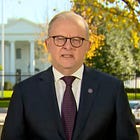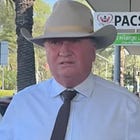Trade Minister Credits Rudd for Critical Minerals Breakthrough, Defends Tariff Strategy Amid Opposition Attacks
This piece is freely available to read. Become a paid subscriber today and help keep Mencari News financially afloat so that we can continue to pay our writers for their insight and expertise.
Today’s Article is brought to you by Empower your podcasting vision with a suite of creative solutions at your fingertips.

Trade Minister Don Farrell credited U.S. Ambassador Kevin Rudd’s months-long diplomatic efforts for sealing the $8.5 billion critical minerals deal with Washington, pushing back against opposition claims the government surrendered leverage by failing to secure tariff relief for Australian steel and aluminum exports.
Farrell told ABC’s afternoon briefing Wednesday that Rudd “has been working very hard since the first lot of discussions on this topic a number of months ago to get an outcome that’s both very good for Australia and very good for the United States.”
The comments came as opposition leader Sussan Ley maintained pressure on Prime Minister Anthony Albanese over his failure to negotiate tariff reductions during Tuesday’s Oval Office meeting with President Donald Trump, contrasting Australia’s outcome with UK Prime Minister Keir Starmer’s success in cutting British tariffs by 50%.
“There was no conversation yesterday in the Oval Office about relief from tariffs,” Ley told reporters in Sydney. “Our Prime Minister was unable to do that. Now, there’s 200,000 jobs relying on those industries here in Australia.”
Farrell rejected suggestions the government decoupled the critical minerals agreement from tariff negotiations, insisting Australia continues pressing for removal of the 10% levy on exports to the United States.
“I don’t think we’ve walked away from anything,” Farrell said. “It’s still the position of the Australian Government that these tariffs should be removed. We were able to make progress on the critical minerals issue. We didn’t resolve the issue of tariffs, but we haven’t given up.”
The trade minister said he has raised tariff concerns with U.S. Trade Representative Jamison Greer during four meetings over the past three months. Farrell also revealed he texts Commerce Secretary Howard Lutnick and met Wednesday with Utah Gov. Spencer Cox, who he said texted a photograph of their handshake to Greer.
Truth matters. Quality journalism costs.
Your subscription to Mencari directly funds the investigative reporting our democracy needs. For less than a coffee per week, you enable our journalists to uncover stories that powerful interests would rather keep hidden. There is no corporate influence involved. No compromises. Just honest journalism when we need it most.
Not ready to be paid subscribe, but appreciate the newsletter ? Grab us a beer or snag the exclusive ad spot at the top of next week's newsletter.
“Only an hour ago I raised this very issue with the Governor of Utah, that we think that the American government should be honouring the terms of our free trade agreement and removing those tariffs,” Farrell said.
The minister drew parallels to Labor’s previous diplomatic challenges, noting it took three years to remove all tariffs China had applied to Australian exports when the government took office in the last parliament.
“These things don’t get resolved overnight,” Farrell said. “As nice as it would be to flick your fingers and resolve the issue, they don’t get resolved.”
Farrell explained the critical minerals framework emerged from conversations with his U.S. counterpart in Kuala Lumpur weeks ago, when the trade representative made clear the minerals would “form very much a part of the future between Australia and the United States.”
“Ambassador Rudd explained to the Americans what the benefit for them in this agreement was, that they came to understand that this was important for both of our countries,” Farrell said.
Asked whether China’s recent restrictions on rare earth exports to the U.S. pushed Washington to finalize the deal, Farrell acknowledged the geopolitical dimension without directly confirming the link.
“I think Australia learnt in the couple of parliaments ago what it means if you put all your eggs in the one basket,” Farrell said. “This does mean that America has more choices in terms of where it buys its critical minerals.”
The agreement commits both nations to investing in extraction and production of minerals essential for net zero emissions targets, artificial intelligence systems and data centers. Farrell said projects are ready for immediate deployment, with investment expected within six months.
“What this agreement commits both countries to doing is investing in that extraction and production of those critical minerals into the future,” Farrell said.
Farrell described Australia as “the lucky country in terms of critical minerals,” noting the nation possesses virtually all elements on the periodic table and holds either the largest or second-largest reserves globally.
“What we’ve also got is the expertise to extract these minerals,” he said, citing his meeting with Cox focused on Australian mining technology. “The Americans understand that our technology to extract minerals is very good.”
The minister said value-adding mineral products requires overseas investment, which the bilateral framework provides. He emphasized the economic benefits for both nations through increased job creation and manufacturing capacity.
On China relations, Farrell downplayed concerns the U.S. agreement might damage ties with Australia’s largest trading partner, which accounted for $330 billion in two-way trade last year.
“We have a very good relationship with China,” Farrell said. “The Prime Minister was, before he went to the United States, of course, he spent some time in China. He’s built a very strong relationship with the President of China.”
Farrell said he plans to lead roughly 300 Australian businesses to a major trade fair in Shanghai in coming weeks, marking his 12th meeting with Chinese Trade Minister Wang Wentao.
“We always get a very good welcome when we go to this trade event,” Farrell said. “I’m looking forward, as we did last time, to doing lots and lots more business with China.”
Asked about Beijing’s escalating criticism of Australia following a tense South China Sea military encounter, where China accused the Australian Defence Force of “distributing twisted and absurd propaganda,” Farrell deflected to Defence Minister Richard Marles.
“I’m not the defence minister and I will leave comments on defence matters entirely to him,” Farrell said, adding his focus remains on pushing “Australian companies out the door to try and do more trade.”
On the Albanese-Trump relationship, Farrell suggested the prime minister was building personal ties with the U.S. president similar to those Farrell maintains with American officials.
“Anthony Albanese is a really personable fellow, and I think he, as part of his job as Prime Minister, he goes out of his way to build relationships with all of the countries in our region, and all the important allies,” Farrell said.
The minister emphasized America’s status as Australia’s “most important strategic military partner,” noting the need for good U.S. relations to construct nuclear-powered submarines in Osborne, South Australia, under the AUKUS agreement.
Trump acknowledged during Tuesday’s Oval Office meeting that “Australia has the lowest tariffs of any country in the world,” according to Farrell, suggesting potential openness to future tariff discussions.
“We’ll continue the discussions and I’m sure at every opportunity we’ll seek to convince the Americans that the policy of the application of these tariffs is wrong,” Farrell said.
Back in Sydney, Ley continued attacking the government’s broader economic management, particularly energy policy she characterized as a “part-time broken energy system” undermining manufacturing competitiveness.
“How can you make things in Australia with a part-time broken energy system?” Ley said. “Unless this government delivers an energy grid that supplies affordable, reliable, baseload power, we won’t make things in Australia.”
Ley said Shadow Energy Minister Dan Tehan would lead at least three upcoming policy meetings developing an alternative energy framework balancing grid stability with emissions reduction commitments.
The opposition leader also criticized government spending she said contributes to inflation, framing her party’s approach as offering relief to “mums and dads living in the Shire, struggling with a cost of living crisis” through alternative policies on personal income taxes and fiscal discipline.
Ley invoked the Labor-ACTU partnership model from the Keating-Kelty era of the late 1980s and early 1990s as a workplace relations template. “It was all about raising real wages and productivity together,” she said. “The industrial relations system that this government has is not doing either.”
On the critical minerals agreement itself, Ley offered qualified support while maintaining her tariff criticism. “Commitments by Australia with respect to critical minerals, and we welcome the start of something. We need to look at the detail,” she said. “But nothing about the tariff burden for our steel and aluminium sector.”
The parallel messaging from Farrell and Ley illustrated the political battle lines forming around Albanese’s Washington visit, with the government emphasizing diplomatic achievements and long-term economic benefits while the opposition highlights immediate tariff impacts on Australian workers and industries.
The tariff issue remains central to Australia’s economic relationship with the United States, particularly for steel and aluminum sectors employing 200,000 workers according to opposition figures. Whether ongoing diplomatic engagement produces relief could become a key test of the bilateral relationship’s strength and the government’s negotiating effectiveness heading into federal elections expected within the next year.
Sustaining Mencari Requires Your Support
Independent journalism costs money. Help us continue delivering in-depth investigations and unfiltered commentary on the world's real stories. Your financial contribution enables thorough investigative work and thoughtful analysis, all supported by a dedicated community committed to accuracy and transparency.
Subscribe today to unlock our full archive of investigative reporting and fearless analysis. Subscribing to independent media outlets represents more than just information consumption—it embodies a commitment to factual reporting.
As well as knowing you’re keeping Mencari (Australia) alive, you’ll also get:
Get breaking news AS IT HAPPENS - Gain instant access to our real-time coverage and analysis when major stories break, keeping you ahead of the curve
Unlock our COMPLETE content library - Enjoy unlimited access to every newsletter, podcast episode, and exclusive archive—all seamlessly available in your favorite podcast apps.
Join the conversation that matters - Be part of our vibrant community with full commenting privileges on all content, directly supporting The Evening Post (Australia)
Catch up on some of Mencari’s recent stories:
It only takes a minute to help us investigate fearlessly and expose lies and wrongdoing to hold power accountable. Thanks!







